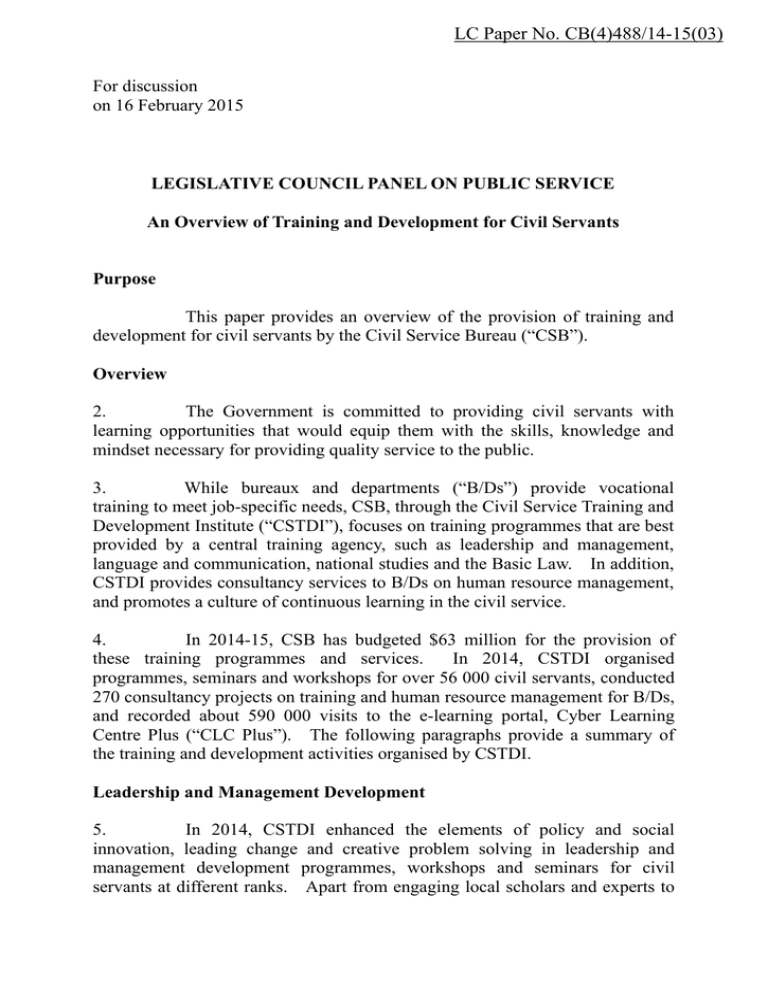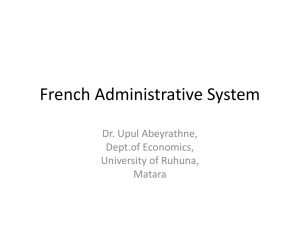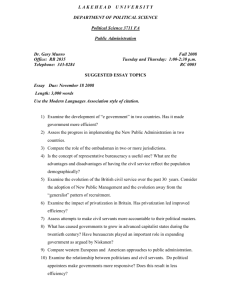An Overview of Training and Development for Civil Servants
advertisement

Paper No. CB(4)xxx/14-15(03) LCLC Paper No. CB(4)488/14-15(03) For discussion on 16 February 2015 LEGISLATIVE COUNCIL PANEL ON PUBLIC SERVICE An Overview of Training and Development for Civil Servants Purpose This paper provides an overview of the provision of training and development for civil servants by the Civil Service Bureau (“CSB”). Overview 2. The Government is committed to providing civil servants with learning opportunities that would equip them with the skills, knowledge and mindset necessary for providing quality service to the public. 3. While bureaux and departments (“B/Ds”) provide vocational training to meet job-specific needs, CSB, through the Civil Service Training and Development Institute (“CSTDI”), focuses on training programmes that are best provided by a central training agency, such as leadership and management, language and communication, national studies and the Basic Law. In addition, CSTDI provides consultancy services to B/Ds on human resource management, and promotes a culture of continuous learning in the civil service. 4. In 2014-15, CSB has budgeted $63 million for the provision of these training programmes and services. In 2014, CSTDI organised programmes, seminars and workshops for over 56 000 civil servants, conducted 270 consultancy projects on training and human resource management for B/Ds, and recorded about 590 000 visits to the e-learning portal, Cyber Learning Centre Plus (“CLC Plus”). The following paragraphs provide a summary of the training and development activities organised by CSTDI. Leadership and Management Development 5. In 2014, CSTDI enhanced the elements of policy and social innovation, leading change and creative problem solving in leadership and management development programmes, workshops and seminars for civil servants at different ranks. Apart from engaging local scholars and experts to - 2 - conduct some of the training, CSTDI also invited guest speakers from relevant fields to share their experiences and insights. About 30 000 officers attended these programmes in 2014. (i) Advanced Leadership Enhancement Programme 6. To enhance the leadership and management skills of directorate civil servants, CSTDI organises an Advanced Leadership Enhancement Programme every year for around 40 directorate civil servants. Comprising two modules each lasting for four days, the programme in 2014-15 is led by professors from the School of International and Public Affairs of the Columbia University, the Ivey Business School of the Western University, and the University of Hong Kong. The programme aims at enhancing participants’ knowledge in public sector leadership, challenges to policy formulation and public governance, policy and service innovation, crisis management, public engagement and human resources management through case studies, panel discussions, guest talks and simulations. (ii) Leadership In Action Programme 7. For senior officers at Master Pay Scale (“MPS”) Point 45 to 49, CSTDI provides a three-week Leadership In Action programme which comprises modules on formulation and implementation of public policies, media and communication skills, stress management, leadership, innovation and change management. The programme is held twice a year for around 70 participants each year. (iii) Innovative Leadership Programme 8. For officers at MPS Point 38 to 44, CSTDI offers a 13-day Innovative Leadership Programme which covers service innovation and implementation, building resilience, public and staff engagement. The programme runs three times a year for around 100 civil servants. (iv) Leadership Essentials Programme 9. A 10-day Leadership Essentials Programme is provided three times a year for around 100 officers at MPS Point 27 to 37. The programme focuses on managing self, motivating people, developing teams, building professional image and understanding the fundamentals of public management. - (v) 3 - Advanced Management Workshops 10. Throughout the year, CSTDI organises a series of Advanced Management Workshops for senior civil servants on a wide range of topics. Led by distinguished scholars and subject experts, workshops usually last for one to two days covering topics such as accountability, public engagement, people management, negotiation, media and crisis communication skills. In 2014, about 700 officers attended these workshops. (vi) Seminars and Management Programmes 11. CSTDI organises regular short seminars delivered by prominent speakers and experts on topical subjects for senior civil servants. In 2014, seminars on “Opportunities and challenges for Hong Kong’s long term economic development”, “Strategies for tackling Hong Kong’s demographic challenges”, “Social enterprises: building a better society through innovation and collaboration”, “Getting the most from social media: opportunity and challenges”, etc were arranged. In addition to seminars run by CSTDI, we sponsored civil servants to attend leadership programmes at local institutions such as the “Leadership and Public Policy Programme” jointly organised by the Hong Kong University of Science and Technology and the Oxford University. In 2014, about 1 800 civil servants attended these seminars and programmes. 12. CSTDI also provides a wide range of training programmes to enhance management knowledge and skills of civil servants and support the implementation of policies and departmental initiatives. The following are some examples of programmes provided in 2014 (a) induction training for new recruits covering integrity and core values of the civil service; (b) briefings and workshops to update civil servants on legislation and guidelines on equal opportunities, workshops on gender, race and cultural sensitivity, disability discrimination issues, and training courses to support the free access initiatives in government premises; (c) workshops on supervisory accountability as well as coaching and counselling skills to strengthen supervisors’ managerial capability; (d) seminars and workshops on principles and skills in performance management and promotion of best practices within the civil service; and - (e) 4 - courses for enhancing the quality of customer service, handling public complaints, managing conflicts, managing stress and maintaining emotional well-being. In 2014, about 27 000 civil servants attended the above programmes. (vii) Attachment and Overseas Programmes 13. Other than classroom training, we also arrange attachment programmes for senior civil servants to develop broader perspectives. These include attachments to policy bureaux, regional and international public bodies such as the Asia-Pacific Economic Co-operation (“APEC”) Secretariat, the Organisation for Economic Co-operation and Development and the Financial Action Task Force, as well as the private sector. CSTDI also sponsors selected civil servants to attend executive development programmes at renowned overseas institutions, such as the Kennedy School of Government of the Harvard University, the London Business School of the University of London and INSEAD. Most of these overseas programmes last for four weeks. (viii) E-learning Resources on Leadership Development 14. CSTDI provides online learning resources at the “Leaders’ Corner” of the CLC Plus website for continuous learning by directorate and senior officers. These resources include articles and book summaries on leadership and management subjects, highlights of local seminars, insights and observations contributed by participants of overseas and Mainland programmes. The platform provides a useful forum for cross learning and sharing of experiences. National Studies and Basic Law Training 15. CSB has been devoting resources to enhance civil servants’ understanding of the latest developments in the Mainland, and promote sharing and exchange between Mainland and Hong Kong civil servants. These efforts include training courses, seminars, theme-based visits to the Mainland, a civil service exchange programme and a dedicated website on Mainland-related information and development. In addition, we also provide training on the Basic Law and organise a variety of promotional activities to enhance understanding of the Basic Law amongst civil servants. In 2014, about 13 000 officers attended these progammes. - 5 - National Studies Training (i) National Studies Programmes at the Chinese Academy of Governance 16. We have arranged a one-week programme for senior directorate officers (i.e. those at Directorate Pay Scale Point 3 (D3) and above) and a two-week programme for officers at junior directorate (D1-D2) level at the Chinese Academy of Governance. The programme aims to provide participants with an update of Mainland government’s policies and developments and provide opportunities for sharing and exchanges with senior Mainland officials and scholars. In 2014, about 70 directorate officers attended the two programmes. (ii) Tsinghua University, Peking University and China Foreign Affairs University Programmes 17. For senior civil servants at MPS Point 45 or above, CSB has been organising the Tsinghua University Programme and the Peking University Programme for them. Both programmes last for 17 days, and include classroom lectures and visits to state agencies in Beijing, as well as a 3-day visit to selected Mainland cities. Besides, we have commissioned the China Foreign Affairs University to organise a one-week Foreign Affairs Studies Programme for civil servants also at MPS Point 45 or above who are involved in external affairs. The programme covers China’s foreign affairs, protocol and other related topics. In 2014, 295 civil servants attended these programmes. (iii) Jinan University, Nanjing University and Zhejiang University Programmes and Thematic Study Programmes 18. For civil servants at MPS Point 34 to 44, we have commissioned the Jinan University, Nanjing University and Zhejiang University to run a one-week programme which covers the latest socio-economic and political developments in the Mainland, with special focus on the cultural and regional development in the Pearl River Delta region or Yangtze River Region. Besides, for civil servants at MPS Point 34 or above, we have also organised thematic study programmes which take the form of study visits to selected Mainland provinces and cities to study selected areas or themes. In 2014, 330 civil servants attended these programmes. (iv) Civil Service Exchange Programme with the Mainland 19. The civil service exchange programme with the Mainland - 6 - commenced in 2002 and since 2014, we have partnered with the governments of Beijing, Shanghai, Chongqing, Hangzhou and Wuhan. Under the programme, civil servants of one side are attached to government departments of the other side for about four weeks with a view to sharing experience and fostering networking and communication. During the attachment, participants will study the host organisations' work practices through attendance at briefings, meetings, discussion forums, experience sharing sessions and site visits, etc. Participants will not take up any specific posts or duties in the host organisations. In 2014, five Hong Kong civil servants, at MPS Point 45 to 49, and 22 Mainland officials, mostly at division director or deputy division director level, participated in the exchange programme. The scope of exchange, which varies from year to year depending on the interests of the two sides, covered a wide range of disciplines, such as city planning, traffic management, public housing, health and food safety, trade and commerce, information technology, culture and arts, etc. (v) Local Seminars and e-learning resources on National Studies 20. We work closely with local and Mainland institutions in conducting seminars on the latest developments in the Mainland for civil servants at different levels. In 2014, seminars such as “Renminbi internationalisation and China’s financial reform” and “China’s diplomacy with neighbouring countries” were organised. About 6 300 civil servants attended these seminars. On the CLC Plus website, we have administered a learning portal on national studies which provides information about the Mainland, covering areas like the political and civil service systems, the economy, the legal framework and geographical data, etc. Basic Law Training 21. We organise Basic Law courses for civil servants, at different stages of their careers, to equip them with knowledge about the Basic Law. Foundation training is provided to new appointees to provide them with an overview of key concepts and major provisions of the Basic Law. For officers at MPS Point 34 and above, training programmes are organised to update them on the latest development of the Basic Law through the use of related court cases. We have also assisted departments to organise programmes to address their departmental training needs, and have offered seminars on specific topics relating to the Basic Law. In 2014, about 6 000 civil servants attended these courses and seminars. 22. Online resources on the Basic Law are also available at the CLC Plus website. These resources include web courses, online seminars, - 7 - presentation materials of course speakers, judgments of major court cases relating to the Basic Law, articles and speeches. We also publish jointly with the Department of Justice and the Constitutional and Mainland Affairs Bureau a “Basic Law Bulletin” and provide a “Basic Law Corner” in the Civil Service Newsletter which is circulated to all civil servants. Consultancy Services on Human Resource Management and Development 23. CSTDI provides consultancy services and assistance to B/Ds in conducting training needs analysis, developing departmental training and development plans, as well as designing and organising tailor-made classes and activities for their staff. We also organise workshops and retreats for B/Ds to review or formulate their vision and mission statements, draw up business strategy, build team spirit and strengthen communication with staff. 24. We assist B/Ds to develop and implement competency-based performance management systems as well as provide advisory services on related performance management and appraisal matters. We also disseminate best practices on training and human resource management through experience sharing sessions, and provide advice on ways to groom promising officers and formulate long term human resource development plans. Continuous Learning 25. We actively encourage civil servants at all levels to pursue continuous learning for enhancing their capabilities and meeting higher performance standards. Diversified training and learning opportunities are made available to different grades and ranks of civil servants. Language and Communication Training 26. We provide language and communication training to help civil servants at different levels polish the skills required for effective communication at work. CSTDI offers a range of English, Chinese, Putonghua and communication courses for both general and job specific situations, enabling civil servants to communicate effectively with colleagues and the general public. In 2014, about 14 000 civil servants attended these courses. Apart from classroom training, a full range of e-learning resources including web courses, articles, writing tips and reference guides are available for self-learning. - 8 - Enhanced E-learning resources 27. We continue to enhance e-learning opportunities for civil servants. The CLC Plus website now offers about 2 250 items of learning resources which include web courses, articles, video clips, CSTDI library collection information, learning tips, book summaries and publications, guidelines and best practices as well as course reference materials. Twenty B/Ds have also made use of our platform and have put over 140 pieces of training materials of their own disciplines on the CLC Plus website. Financial Sponsorship 28. We offer a Training Sponsorship Scheme to encourage officers to pursue learning through external courses. Under the Scheme, civil servants whose starting salary at MPS Point 16 or below (or equivalent), including Model Scale I staff, may apply for reimbursement of course fees for self-arranged studies. The sponsorship ceiling is $6,000 per applicant per year for a maximum of three courses, all to be pursued outside office hours. For the 2014-15 Training Sponsorship Scheme, about $2 million will be allocated to B/Ds for about 570 applications. In addition, all civil servants can apply for training sponsorship by their respective B/Ds for attending training courses that are job-related. Way Forward 29. We will continue to keep our training programmes under review and to strengthen our consultancy and training support to B/Ds for meeting new demands and challenges. Civil Service Bureau 16 February 2015



![-----Original Message----- From: Roger Hagen [ ]](http://s2.studylib.net/store/data/015586848_1-9f05ba3c445ad07507245fa493f4f9c6-300x300.png)



